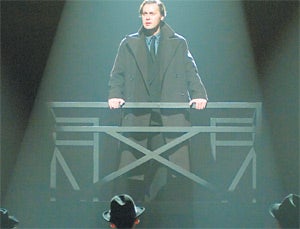Me and Orson Welles (12A)
Life with citizen Welles

"BARD BOFFOLA!" was how Variety led the raves for Orson Welles's stage production of Julius Caesar at the Mercury Theatre, New York, in November 1937. The play, styled in the fedora-and-overcoat look of fascist Italy, was one of Welles's earliest triumphs (he was 22), yet in fact its legend rested on a knife-edge, as Richard Linklater's wry new film recounts. Right up to its first disastrous preview the production was in trouble, dogged by debt and unsettled by Welles's own autocratic tendencies as actor-director-impresario. People in the know were already predicting that the Mercury itself would fold by the end of the week.
Me and Orson Welles considers the chaotic run-up to that first night, as seen through the eyes of a 17-year-old high-school student who, through a combination of cheek and talent, secures a minor role in the play right opposite the Great Man. Richard Samuels (Zac Efron) happens to be loafing around the Mercury in midtown Manhattan when Orson Welles (Christian McKay) comes barrelling out of the building and, without much preamble, hires him on the spot. Whether he recognises a kindred spirit, or else just another underling he can bully, Welles adopts the kid as troupe mascot. Richard might perhaps have been more curious about the vacancy – another of Welles's random firings – but he's too enthralled by his sudden recruitment into the whirligig of theatre life, with its sophisticated vulgarities, exuberant camaraderie and promise of acclaim. What 17-year-old's head wouldn't be turned?
Richard's heart proves just as vulnerable once he's befriended by Sonja Jones (Claire Danes), secretary to Welles and a fierce bundle of ambition in her own right: she wants an audience with Hollywood mogul David O.Selznick, and isn't afraid to trample over loyalty to get it. At first you suspect that the film, written by Holly Gent Palmo and Vince Palmo from a novel by Robert Kaplow, will turn on a struggle between integrity and self-interest – the sort of story in which the young hero must "hang on to his soul" in the face of severe temptations. It doesn't work out like that, however, mainly because Welles is presented as an irresistible force of nature: abrasive and despotic, for sure, but hugely charming and inspirational. He exasperates those around him, from his soft-spoken business partner John Houseman (Eddie Marsan) to his actors and stage-hands at the Mercury, yet they all bend to his will because they all sense how extraordinary he is.
Christian McKay's performance in the title role measures up to that extraordinariness, both inhabiting Welles's magnetic, overweening personality and approximating a decent physical likeness: he hasn't quite nailed the basso profundo boom of the voice, but the princeling swagger and baby-softness of the face are spot-on. In the play Welles took for himself the role of Brutus, another leader of men with heroic aspirations. Early on we see his brilliant knack for improvisation when, having treated Richard to a recitation from a favourite novel, The Magnificent Ambersons (which he would later turn into a film), Welles turns up at a radio drama recording and, off the cuff, adapts the very same words to his part. Confident of his genius, he's a natural at inspiring others: he claims to see "images of magnificence" in Richard's acting, a blandishment slightly devalued when Richard overhears him saying exactly the same thing to a British actor (Ben Chaplin) stricken with stage fright. And, like Brutus, Welles proves no stranger to perfidy, reacting with vindictive gracelessness when Richard dares to challenge his dominion.
With so much going on in the performances, both offstage and on, it's perhaps a little disappointing that Me and Orson Welles turns out to be rather slack in its plotting. After Richard is briefly fired for crossing Welles, Joseph Cotten (James Tupper) advises him to make up with the boss and apologise for his imprudent remarks. But somehow it transpires that Welles is the one who sues for peace and comes cap in hand to Richard. You may also groan at a corny little bookending device in the story, whereby Richard has a chance encounter with an aspiring young writer (Zoe Kazan). Instead of leaving it as a wistful footnote on hopefulness, the script makes Richard an unlikely midwife to the woman's talent – he only manages to get her short story published in The New Yorker! It's strange, because at other times the film is dryly funny about the vanity of young people puffing up their own talent. When Richard delivers his single line at rehearsal and hurries off stage, he asks the cynical old prompter in the wings, "How did I do?" The prompter, his expression impassive, replies, "I cried".
In most respects Linklater has done right by his subject, rescuing Welles's coup de theatre from history's review columns and making it live again: the snatches of Julius Caesar we see performed really do convey the brooding tension and bloody violence of Shakespeare's play. And, because he is so good with actors, you stay with the film even in its flimsier passages. Zac Efron's cocksure Richard might have been annoying but for the flicker of vulnerability in his gaze; he gives his ukulele-playing a distinct twang of pathos. Canny of the producers to cast him. If his crossover appeal can draw some of the High School Musical crowd, we might even hope for a small reprise of Bard Boffola.
Join our commenting forum
Join thought-provoking conversations, follow other Independent readers and see their replies
Comments
Bookmark popover
Removed from bookmarks